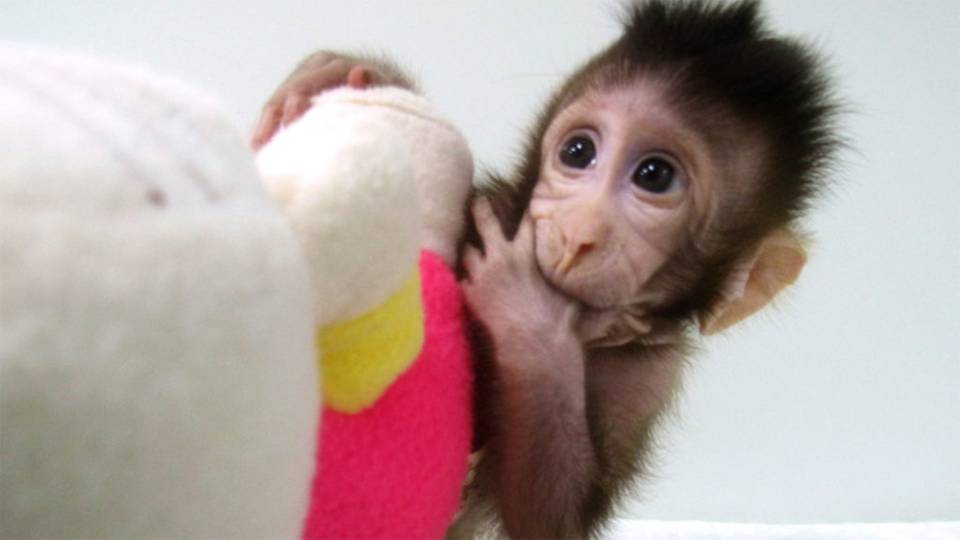In a Scientific First, Cloned Monkeys Are Born. Will They Accelerate Biomedical Research?
There have been mice and cows and pigs and camels, bunnies and bantengs and ferrets and dogs, but ever since Dolly the sheep became the first cloned mammal in 1996, the list has had a conspicuous hole: primates. Now that hole has been filled.
Scientists in China reported on Wednesday in Cell that they had cloned two healthy long-tailed macaque monkeys from the cells of another macaque, using the Dolly technique. The two clones, born 51 and 49 days ago, were created from a fetus’s cells; so far, the scientists have not been able to make the tricky procedure work when they used cells from adult macaques. That would seem to postpone the dystopian day when cloning children and grown-ups becomes as mainstream as IVF. But because “the technical barrier [to cloning primates] is now broken,” co-author Mu-ming Poo of the Institute of Neuroscience in Shanghai told reporters, the technique “could be applied to humans” — something he said his team has no intention of doing and sees no reason for.
Cloning pioneers said the monkey clones represented, as Dr. Robert Lanza put it, “an impressive breakthrough, which overcomes the last major hurdle in the field.” Lanza co-led teams that cloned a gaur in 2000 and in 2014 used the Dolly technique to produce human embryos (but not pregnancies) from the cells of an adult.
Before this, “no one was able to produce living offspring” through primate cloning, said Shoukhrat Mitalipov, of Oregon Health and Science University, who in 2013 also used the Dolly technique to create human embryos (technically, blastocysts) from the cells of an 8-month-old. (He did not use the embryos to create pregnancies either.) “These guys made it work, which is quite an achievement.”
The cloning team said its breakthrough might one day be used to produce genetically identical monkeys for biomedical research. Most of the lab animals used to study diseases, from cancer to Alzheimer’s, are highly inbred mice. But mice don’t get every human disease or don’t get it the way people do. Mice genetically engineered to express the human cystic fibrosis gene, for instance, don’t develop that disease’s characteristic lung problems, and mice don’t mimic human neurological and psychiatric diseases such as schizophrenia and autism very well.
If monkey clones can be created routinely, they can also be genetically altered, one gene at a time, with techniques such as CRISPR. “You can produce cloned monkeys with the same genetic background except the gene you manipulated,” senior scientist Qiang Sun told reporters. “This will generate real models not just for genetically based brain diseases, but also cancer, immune, or metabolic disorders.”
Postdoctoral fellow Zhen Liu spent three years optimizing the Dolly recipe for primates. Called somatic cell nuclear transfer (SCNT), the technique involves fusing a somatic cell — meaning anything other than a sperm or ovum — with an egg whose nucleus has been removed. (Zapping the egg with laser light helped, Liu found.) An hour or two later he used two chemicals to faux-fertilize the egg (no sperm needed), spurring it to start developing into an embryo.
The DNA in the somatic cell took over. As the egg divides and divides, the resulting embryo is a genetic copy of the animal the somatic cell came from. If transplanted into a surrogate mother, it develops into a fetus and, if all goes well, a newborn. In reality, no one had managed to get live births of cloned primates. A big stumbling block was that DNA from the somatic cell resisted reverting to its embryonic state where it is able “to express all the genes needed for embryonic development,” Poo said.
Read the rest of the article here.






















